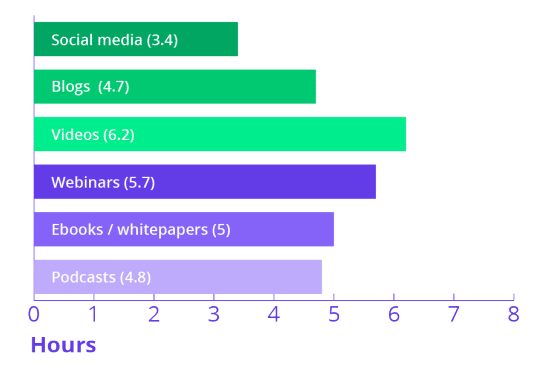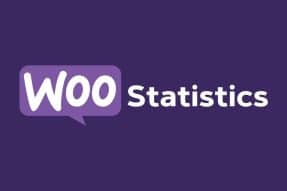Content Marketing Statistics (How Many Content Marketers Are There?)
Interested in learning more about the state of content marketing this year? You’re in the right place.
In this content marketing statistics roundup, we’ll explore all the latest data about the content marketing industry.
And we’ll share some data-driven insights to help inform your content strategy for the year ahead.
Ready? Let’s get started
Content marketing statistics (top picks)
- There are over 31,000 content marketing managers in the US, and tens of thousands more content marketing professionals in other specialisms.
- The average content marketer earns between $56k and $93k annually, depending on the specialization.
- Social media literacy and leadership qualities are the top skills employers look for in content marketers
- 97% of marketers include content marketing in their overall strategy
- 69% of marketers promote content through organic social media, making this the top content distribution channel
- 57% of marketers have a documented content marketing strategy, but that increases to 78% when we look at those who rate their content marketing efforts as successful.
- 55% of marketers say improving content quality is the most effective content marketing tactic (that’s more than any other tactic)
- 51% of content marketers measure organic traffic, making this the #1 most popular content marketing metric.
- 45% of content marketers say boosting brand awareness is their primary goal, making this the #1 most common content marketing goal.
- Short-form video is the most popular type of content for the third year in a row
- Videos are the most effective content type, according to 37% of surveyed marketers (more than any other content format)
How many content marketers are there?
There’s no available data on the number of content marketers employed globally. The best estimations we have to go on come from Zippia and are verified against the BLS, Census, and job openings data.
Their research shows over 31,000 content marketing managers are employed in the US.
However, content marketing managers represent just one of many job titles in the content marketing employment industry.
Many other specialists work in content marketing, including SEO experts, content writers, content producers, strategists, etc.
The figure above also doesn’t factor in the number of content marketers employed in other countries worldwide.
Therefore, when you factor all that in, we estimate that there are most likely hundreds of thousands of content marketers globally, if not millions.
Number of content marketers by specialism (US)
The table below shows the estimated number of content marketers employed in the US by specialism, according to data extracted from Zippia.
| Job title | Number of employees (US) |
| Content marketing manager | 31,303 |
| Content writer | 5,785 |
| Content specialist (marketing) | 11,457 |
| Content strategist | 5,905 |
| Content producer | 7,931 |
How much do content marketers earn?
The salary of content marketing professionals varies depending on job title, location, experience level, etc. But typically, content marketers in the US can expect to earn around $40,000 to $100,000 per year.
The table below shows a more detailed breakdown according to earnings data from Zippia:
| Job title | Average salary (USD/year) | Average hourly rate (USD/hour) | Lowest salary (bottom 10%) | Highest salary (top 10%) |
| Content marketing manager | $84,566 | $40.66 | $65,000 | $108,000 |
| Content writer | $58,918 | $28.33 | $40,000 | $84,000 |
| Content specialist (marketing) | $56,939 | $27.37 | $41,000 | $77,000 |
| Content strategist | $93,672 | $45.03 | $67,000 | $129,000 |
| Content producer | $56,255 | $27.05 | $38,000 | $81,000 |
As you can see, senior roles that involve higher-level marketing duties (like content strategists and managers) are the top earners. In contrast, those involved in actually creating the content (like content writers and producers) are the lowest earners.
Content marketer gender split
Content marketing professionals are more likely to be women than men (except content producers), according to data from Zippia. Here’s a breakdown of the gender split by job role:
| Job title | Male | Female |
| Content marketing manager | 40% | 60% |
| Content writer | 39.8% | 60.2% |
| Content specialist (marketing) | 38.9% | 61.1% |
| Content strategist | 44.3% | 55.7% |
| Content producer | 60.4% | 39.6% |
Content marketer education & qualifications
Most content marketing professionals hold a Bachelor’s degree or above. And more senior positions are likely to have higher levels of education. Here’s a breakdown of education level by job role:
| Job title | High school diploma | Associate degree | Bachelor degree | Masters degree | Doctorate | Other |
| Content marketing manager | ~ | 3% | 81% | 14% | 1% | 1% |
| Content writer | 2% | 6% | 77% | 12% | ~ | 3% |
| Content specialist (marketing) | 1% | 4% | 82% | 11% | ~ | 2% |
| Content strategist | ~ | 3% | 79% | 15% | 1% | 2% |
| Content producer | 1% | 5% | 83% | 10% | ~ | 1% |
Content marketer age
The average age of content marketers in the US is between 30 and 50, depending on the specialism. See the table below for a breakdown of average age by job role.
| Job title | Average age |
| Content marketing manager | 38 |
| Content writer | 41 |
| Content specialist (marketing) | 37 |
| Content producer | 40+ |
What skills do content marketers need?
According to a 2020 analysis of content marketing job postings, the most in-demand skills employers look for in content marketing professionals are social media literacy and leadership qualities. Each of these skills is listed in 49% of analyzed job ads.
SEO and respecting deadlines were other in-demand skills and were present in 44% of job ads.
Sources: Zippia1, Zippia2, Zippia3, Zippia4, Statista1
General content marketing statistics
Next, let’s look at some general content marketing statistics that tell us more about the size and shape of the content marketing industry, and how many businesses and marketers utilize content in their marketing strategies.
How many marketers utilize content marketing?
According to a recent survey, 97% of marketers say content marketing forms part of their strategy. This is the overwhelming majority and shows that content is still king in marketing as we approach the end of 2022.
How long do people spend consuming content?
The average daily time spent consuming content is 6 hours and 59 minutes.
To put that into perspective, most people are only awake for 15-16 hours daily. So the average person spends almost half their waking day consuming content. Crazy, right?
It’s also worth noting that the daily time spent consuming content grew substantially over the last few years.
Content marketing revenue
Global content marketing industry revenue was estimated to be around $66 billion in 2021. While that’s already a huge figure, it’s expected to climb even further over the next few years. Industry estimations say global content marketing revenues will reach 147 billion by 2026.
How popular is content marketing?
In a recent survey, content marketing was rated the fourth most popular marketing channel this year.
32% of surveyed marketers and brands said it was the top marketing channel. That puts it behind social media (44%), websites/blogs (36%), and email marketing (35%), but above other channels.
How effective is content marketing?
The vast majority of marketers that utilize content marketing say their efforts have been at least somewhat effective:
- 19% of marketers say their content marketing efforts have been very successful
- 33% of marketers say their content marketing efforts have been moderately successful
- 39% of marketers say their content marketing efforts have been somewhat successful
- 9% of marketers say their content marketing efforts have been unsuccessful
What stages of the funnel do businesses create content for?
More than half of all businesses create content for the middle of the funnel, and over a third create content for the top of the funnel.
Here’s a more breakdown of the percentage of surveyed businesses that create content for each stage of the funnel:
- Middle of the funnel – 53%
- Top – 35%
- Retention – 25%
- Bottom – 22%
- Other – 2%
Sources: HubSpot3, Semrush, Forbes, Statista2
Content marketing distribution statistics
Content can be distributed and promoted through various marketing channels, such as email, social media, websites, paid ads, etc.
Here are some statistics that tell us more about content marketing distribution and promotion.
What channels do marketers promote content on?
The most popular channel for content promotion is organic social media, with 69% of surveyed marketers saying they promote content on organic social media. In comparison, only 54% promote content via email, the second most popular promotional channel.
Top 10 channels for content promotion according to surveyed marketers:
- Organic social media – 69%
- Email – 54%
- Paid social media – 48%
- Organic search – 44%
- Sponsorships – 24%
- Paid ads (PPC) – 24%
- PR/outreach – 22%
- Influencer marketing – 21%
- Guest posting – 14%
- Native ads/sponsored content – 13%
Top owned content distribution channels
According to a recent study, the top three owned content distribution channels are personal websites, blogs, and email newsletters.
Owned distribution channels are properties that your brand has full ownership of. This differentiates them from earned and paid media channels like social media, paid search, etc.
Sources: Semrush, Hubspot1, Hubspot2
Content marketing strategy statistics
Only a little over half of surveyed marketers have a documented strategy in place. But statistics show that having a documented strategy directly correlates with the success of content marketing efforts. And strategies that focus heavily on creating high-quality content are the most effective.
What percentage of marketers have a content marketing strategy?
57% of surveyed marketers have a documented content marketing strategy, while 40% don’t have one and 3% aren’t sure.
When asked what stage they’re at in putting together their content marketing strategy, 42% said they were still in the ‘first steps’ stage. A further 36% said their strategy is fairly developed, and 19% said it is advanced. 3% of respondents weren’t sure.
Do you need a content marketing strategy?
78% of companies that rate their content marketing efforts as very successful have a documented content marketing strategy. And 81% of those that rate it unsuccessful have no documented content marketing strategy in place.
The upshot of this is clear: Marketers should take time to put together a clear content marketing strategy before launching their campaigns. You’re more likely to be successful if you go in with a plan.
Most effective content marketing tactics
Surveyed marketers were asked which tactics had the biggest impact on the success of their content strategy.
The table below shows how many respondents said each tactic was the most successful as a percentage of those surveyed.
| Content marketing tactic | % of respondents |
| Improving the quality of content | 55% |
| SEO (search engine optimization) | 46% |
| Producing more visual & video content | 41% |
| Updating and reusing existing content | 38% |
| Website optimization | 35% |
| Competitor content analysis | 28% |
| Audience research and customer journey optimization | 26% |
| Creating more educational content | 25% |
| Adapting their strategy in response to COVID | 24% |
| Diversification of content mix | 24% |
As you can see, the #1 most effective content marketing tactic was thought to be improving the quality of content produced.
And in general, quality seems to be much more important than quantity.
83% of marketers believe creating higher quality content less often is more effective, while only 17% believe it’s more effective to create lower content more often.
Most effective tactics to rank content
Quality is again the most effective tactic When ranking content organically in search engines like Google, according to most marketers.
The table below shows the % of surveyed marketers that said each tactic was the most effective at ranking content organically.
| Content marketing tactic | % of respondents |
| Improving content quality and authenticity | 61% |
| Publishing content more frequently | 45% |
| Focusing more on keyword research | 43% |
| Publishing more content with original research and insights | 32% |
| Improving technical SEO | 28% |
| Implementing or improving a content cluster strategy | 26% |
| Building links and guest posting | 23% |
| Other | 1% |
When should you start planning your content strategy?
According to a survey of media planners, 1-2 months ahead of campaign launch is the most common time to start planning your content strategy:
- 34% of media planners start planning their content strategy 1-2 months in advance
- 27% of media planners start planning their content strategy 3-4 months in advance.
- 15% of media planners start planning their content strategy just 3-4 weeks in advance
Sources: Semrush, Hubspot2, HubSpot3
Content marketing goals and KPIs
Around two-thirds of content marketing teams track their content marketing campaigns to measure performance against their marketing goals.
To do so, marketers look at various metrics and KPIs. The top three most commonly-used metrics are organic traffic, search ranking position, and leads.
These metrics closely correlate with the top three most common content marketing goals: boosting brand awareness, driving traffic, and lead generation.
Do marketers measure content performance?
A recent survey found that 66% of content marketing teams measure content performance.
20% don’t measure their content performance, and 15% of those surveyed don’t know whether or not they measure content performance.
Top content marketing metrics & KPIs
Here are the top 10 content marketing metrics and KPIs used to measure success, alongside the percentage of respondents that said they use them:
- Organic traffic – 51%
- Search ranking – 42%
- Leads – 40%
- Conversion rate – 34%
- Social shares – 32%
- Email engagement – 32%
- Page views – 31%
- Time on page – 30%
- Subscribers – 27%
- Bounce rate – 22%
Most common content marketing goals
Here are the top 10 most common goals of content marketing campaigns, alongside the percentage of respondents that selected them:
- Boost brand awareness – 45%
- Drive website traffic – 37%
- Lead generation – 36%
- Sales/revenue generation – 27%
- Boost customer loyalty and engagement – 23%
- Gain and nurture subscribers – 14%
- Promote new products or improve positioning – 11%
- Other – 0%
Sources: Semrush
What’s the most popular type of content?
Video is both the most popular and most effective media format used in content marketing.
Short-form video has been the most popular type of content for three years and is becoming the preferred way for brands to interact with their customers.
This focus on short-form video content makes sense in the context of changing consumer trends and the growth of short-form video-sharing apps like TikTok and Instagram reels.
Demand for video content reached an all-time high in recent years. In 2021, Wistia had around 4.7 billion video plays, up 77% compared to 2019. And total watch time reached 14.6 billion video minutes, up 121% from 2019.
Top media formats content marketers use
According to data from HubSpot, 59% of content marketers include video in their content mix. This makes it the number one most popular media format.
Here are the top 5 most popular media formats by the percentage of surveyed marketers that use them:
- Videos – 59%
- Blogs – 48%
- Images – 46%
- Infographics – 45%
- Case studies – 42%
What type of content drives the best results?
Aside from being the most common type of content, video is also the most effective type of content. 37% of marketers say it drives the best results—that’s more than any other format.
Here are the top 10 most effective content types by the percentage of surveyed marketers that selected them:
- Videos – 37%
- Blog posts – 36%
- Success stories – 22%
- Case studies – 16%
- Webinars – 16%
- Infographics – 15%
- Product guides – 13%
- Data visualizations – 12%
- Ebooks – 11%
- White papers – 11%
Sources: Semrush, Hubspot1, HubSpot3
Content marketing & social media
As we discussed earlier, social media is one of the most widely used channels for distributing and promoting content. So next, let’s look at some content marketing statistics that pertain specifically to social media.
Top content types used in social media
Here are the most common content types used in social media, according to a recent survey:
- Content that reflects the brand’s values – 47%
- Interactive content (games, polls, etc.) – 45%
- Funny content – 45%
- Trendy content – 42%
- Relatable content – 39%
- Behind-the-scenes content – 36%
- Educational content – 32%
- Nostalgic content – 28%
Most effective content types used in social media
Surveyed marketers were also asked which types of social media content they thought were the most effective. Here are the results:
- Funny content – 80%
- Interactive content – 77%
- Behind-the-scenes content – 68%
- Relatable content – 67%
- Content that reflects brand values – 63%
- Trendy content – 61%
- Nostalgic content – 58%
- Educational content – 57%
Interestingly, funny content is thought to be the most effective content type, yet it is only the third most commonly used type of content, which suggests it may be underutilized.
Most effective social content formats
85% of surveyed marketers said the most effective format for social content is short-form videos. That includes Instagram Reels, YouTube Shorts, and TikTok videos.
Live streaming was the second most effective content format with 70% of the vote. And live audio chat rooms came third at 65%.
Sources: HubSpot3
B2B content marketing statistics
The content marketing statistics below are compiled from a report by Casted, which analyzed responses from 100 b2b content marketers in the US.
The b2b content marketers who participated in the study encompassed various different job roles including content director, manager, writer, specialist, etc.) in the US.
How long do b2b marketers spend making content?
B2b content marketers spend an average of 33 hours a week making content.
Time spent making content by type:

- Social media – 3.4 hours per project
- Blog posts – 4.7 hours per piece
- Videos – 6.2 hours per project
- Webinars – 5.7 hours per project
- Ebooks/whitepapers – 5 hours per piece
- Podcast – 4.8 hours per episode
What types of content do b2b content marketers create?
- 93-98% of b2b content marketers create social media messages, emails/newsletters, and blog posts.
- 61% of b2b content marketers create videos and webinars
- 47% of b2b content marketers create whitepapers
- 32% of b2b content marketers create podcasts
- 4% of b2b content marketers create audio clips
What do b2b content marketers do?
B2b content marketers have to juggle various responsibilities. The top three tasks they’re responsible for include managing campaigns (61%), determining strategy (58%), and creating content (54%)
Here’s a more complete breakdown of the survey results:
- Managing campaigns – 61%
- Determining strategy and brand management – 58%
- Creating content – 54%
- Social media – 52%
- collaborating with partner vendors and agencies – 43%
- Serving as media liaisons – 41%
- Producing internal communications – 34%
- Customer and market research – 23%
- SEO management – 14%
How do b2b marketers promote content?
Email is the most commonly used channel for promoting content by b2b marketers, followed by LinkedIn:
- 91% of b2b content marketers promote content via emails/newsletters
- 86% of b2b content marketers promote content on LinkedIn,
- 82% of b2b content marketers promote content on Twitter
- 74% of b2b content marketers promote content on Facebook
- 39% of b2b content marketers promote content on YouTube
- 28% of b2b content marketers promote content Instagram
What’s the most effective b2b content format/channel?
According to a recent study, social media is rated as the most effective content format by 98% of surveyed b2b marketers:
- Social media – 98%
- Email – 96%
- Videos/webinars – 61%
- ebooks/whitepapers – 47%
- Podcasts – 32%
Sources: Casted
Website content best practices
Semrush looked at blogs that have 30k-500k monthly views to see what these high-performers have in common. Here’s what they found.
- Blog content with headings that feature the word ‘guide’ get 3x more organic traffic. And those with ‘how to’ in the heading get 1.5x more traffic
- Titles with 7 or fewer words get 36% more organic traffic, on average, than those with 14+ words.
- Almost half (47%) of articles with advanced headings structures (H2s, H3s, and H4s) rank in the highest-performing organic content group, while 39% of those with no H2s are in the low-performing group.
- Articles that have 7+ images get 116% more organic traffic
- Articles that include videos get 83% more organic traffic
- Articles that are 3k words+ get 138% more traffic than those with less than 500 words.
Sources: Semrush
The costs of content marketing
Almost two-thirds of marketers spend at least 10% of their budget on content marketing. And the majority of content marketers expected spending to increase this year.
That content marketing spend was distributed fairly evenly across several areas, but social media and community building was the area businesses spend most on.
How much do businesses spend on content marketing?
- 34% of surveyed marketers said they spend 10-29% of their overall marketing budget on content marketing, making this the #1 spending bracket.
- 20% of surveyed marketers said they spend 30-50% of their marketing budget on content marketing
- 19% of surveyed marketers said they spend 5-9% of their marketing budget on content marketing
- 17% of surveyed marketers said they spend less than 5% of their marketing budget on content marketing
- 7% of surveyed marketers said they spend 50-70% of their marketing budget on content marketing
- 3% of surveyed marketers said they spend over 70% of their marketing budget on content marketing.
Is content marketing spend increasing or decreasing?
72% of surveyed content marketers said they expect their content marketing budget to increase in 2022.
Of those, 32% expect a medium increase, 25% expect a small increase, and 15% expect a large increase.
A further 18% expect no change at all, just 2% expect a decrease, and 8% aren’t sure what to expect.
What areas of content marketing are businesses spending the most on?
- 41% of content marketers spend the most on social media & community building
- 40% spend the most on improving written content quality
- 40% spend the most on promoting and distributing content
- 35% spend the most on video content
- 34% spend the most on customer research
Sources: Semrush
Content marketing search trends
Here are some interesting statistics that highlight some of the latest search trends related to content marketing, per a study by Semrush:
- The average monthly search volume for the keyword ‘content marketing agency’ dropped to 1,900 this year. Last year, it was 5,400.
- Likewise, the average monthly search volume for the keyword ‘content marketing strategy’ fell by 33%.
- However, searches for ‘how to create content for affiliate marketing’ increased by 366%, suggesting that affiliate marketing may be a specific sub-category of content marketing that’s still growing.
Top trending topics related to content marketing
This year’s top trending topic related to content marketing was ‘social media content marketing’, with a popularity score of 99.
Top 10 trending topics related to content marketing by popularity score:
- Social media content marketing – 99
- SEO in content marketing – 76
- Content marketing for building products – 75
- Content marketing strategy examples – 48
- Content marketing decisions – 41
- Content marketing examples – 40
- Video content marketing strategy – 39
- Content marketing tools – 31
- Content marketing platform for agencies – 30
- Content marketing small business – 30
Sources: Semrush
What are the biggest content marketing challenges?
According to a Semrush study, generating quality leads is the top challenge marketers face regarding content marketing. 41% of those surveyed said it was their biggest challenge, more than any other challenge.
| Content marketing challenge | % of respondents |
| Generating quality leads | 41% |
| Driving enough traffic and content promotion | 39% |
| Creating content that audiences appreciate | 31% |
| Proving ROI | 30% |
| Improving content SEO performance | 29% |
| Creating authentic, high-quality content | 28% |
| Coming up with content ideas | 25% |
| Optimizing content marketing workflows | 21% |
| Insufficient resources | 20% |
| Creating content at scale | 19% |
Content marketing team statistics
Here are some statistics relating to content marketing teams.
Average content marketing team size
42% of surveyed content marketing teams say their team comprises between 1 and 3 specialists. This makes this the most common team size.
Most common content marketing team sizes:
- 1-3 specialists – 42%
- No dedicated content team or person – 21%
- 4-10 specialists – 20%
- 11-20 specialists – 9%
- 21-35 specialists – 3%
- Over 50 specialists – 2%
- Not sure – 3%
Who works in content marketing teams?
45% of content marketing teams include a specialist content writer or content creator. This makes content writer/creator the most common specialism within content marketing.
Top 10 specialist roles in content marketing teams:
- Writer/content creator – 45%
- Social media manager – 38%
- Content marketing manager – 30%
- Designer – 26%
- SEO specialist – 24%
- Strategist – 23%
- Web developer – 22%
- Head of content marketing – 21%
- Generalist marketing manager – 19%
- Email marketing specialist – 15%
Top content marketing technologies used by teams
65% of surveyed content marketing teams use social media posting tools. That includes platforms that let you schedule social content in advance via a visual calendar and automate the publishing process.
Most commonly-used content marketing technologies by surveyed teams:
- Social media posting – 65%
- Web analytics – 50%
- Email marketing software – 44%
- SEO software – 41%
- Writing/editing tools – 37%
- CMS – 26%
- Collab tools – 25%
- Visual content creation tools – 24%
Sources: Semrush
Do marketers outsource content creation?
51% of marketers outsource content creation. The other 49% handle it in-house.
Top outsourced content services
- Graphic design – 58%
- Video design – 43%
- Copywriting – 40%
- Editing – 32%
- SEO – 29%
- Strategy – 28%
- Translation – 21%
- Analytics – 17%
Sources: Semrush
Content auditing statistics
2 out of 3 media planners say they run content audients. Of those, 30% of them do so at least monthly.
Top reason to audit content
- Improving UX on a website – 36%
- Identifying and boosting top-performing content – 34%
- Discovering content gaps and new opportunities – 34%
- Improving SEO & SERP ranking – 33%
- Identifying website issues like broken links – 31%
Sources: Hubspot2
Final thoughts
That concludes our roundup of the latest content marketing statistics. We hope you found them useful.
While you’re here, why not check out our roundup of social media statistics to help plan your social content strategy?
Or, you might be interested in these mind-blowing website statistics.
Enjoy!







This Post Has 0 Comments